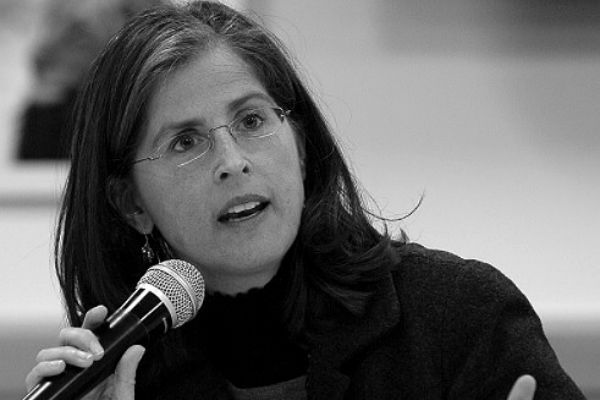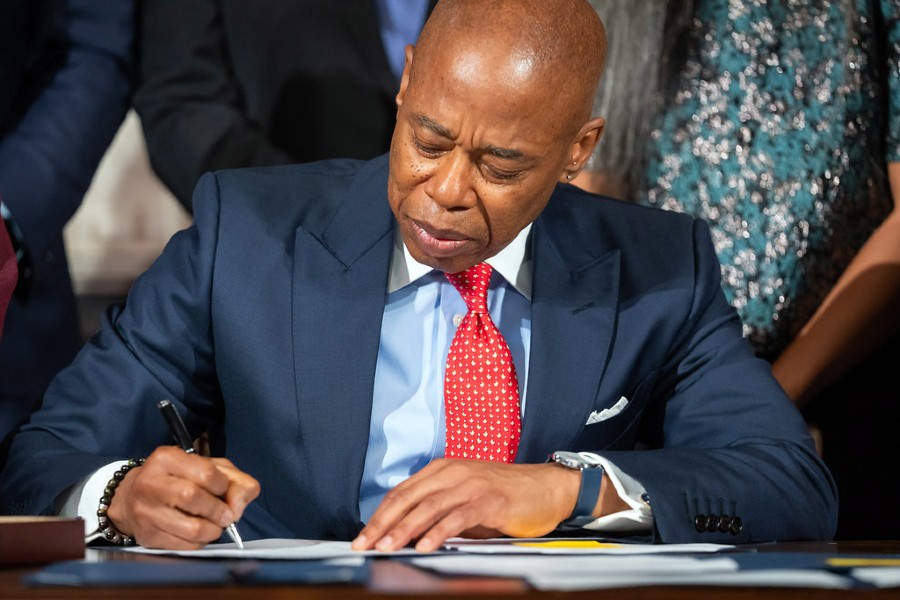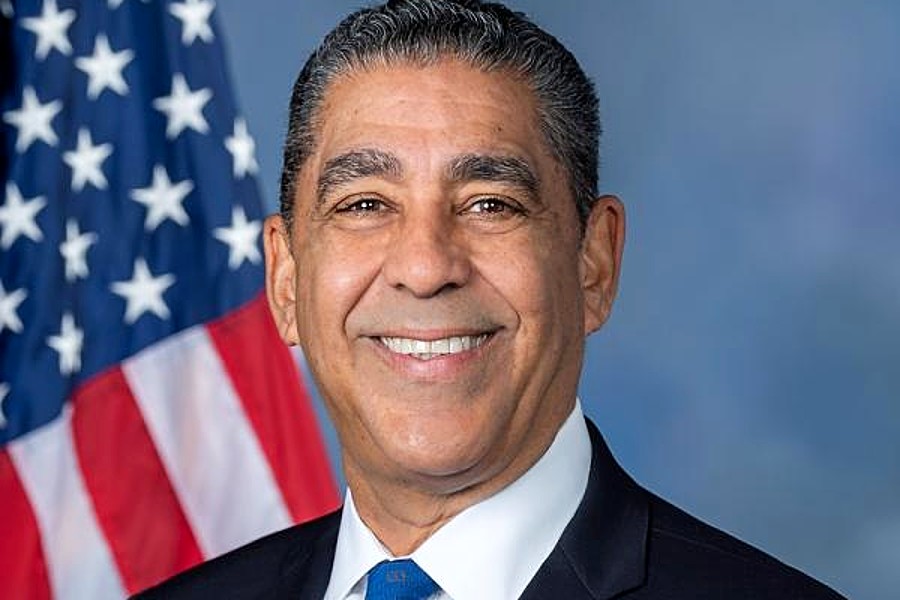 The City Council overwhelmingly passed Council Member Harlem’s Helen Rosenthal’s legislation today establishing an advisory board to address gender and racial discrimination and harassment.
The City Council overwhelmingly passed Council Member Harlem’s Helen Rosenthal’s legislation today establishing an advisory board to address gender and racial discrimination and harassment.
This is experienced by staff in NYC healthcare institutions.
The Council also passed CM Rosenthal’s resolution calling for implicit bias training in medical schools across New York State.
Together, the bill and resolution are steps toward addressing the historic and ongoing discrimination –against both staff and patients– that plagues our healthcare system.
“My legislation will shine an ongoing spotlight on the racial and gender discrimination impacting our healthcare workers, and in turn, their patients. Similarly, my resolution calls on New York State medical schools to educate future doctors about underlying biases which can severely affect patient care,” said Council Member Helen Rosenthal.
“Our healthcare institutions should be centers of healing. We are seeking to improve patient outcomes over the long-term, both by improving workplace conditions for health staff, and tackling implicit bias head-on. I thank the Public Advocate, my Council colleagues, and all the advocates and healthcare workers who helped make passage today possible,” CM Rosenthal continued.
“Race and gender discrimination is pervasive in the healthcare field, from the systems providing the care to the patients receiving it — or being denied it. These disparities predate the pandemic, but the current crisis has further exposed and exacerbated them, devastating for healthcare workers and deadly for patients,” said NYC Public Advocate Jumaane Williams. “I am proud to co-sponsor this legislation which will bring healthcare professionals and students from diverse disciplines and across the city together on a Gender Equity Advisory Board, and add my voice to those calling for the states to mandate medical students receive implicit bias training. Identifying inequities and implementing tangible solutions will bring greater healthcare justice and ultimately save lives.”
For Healthcare Staff
Intro 2064-2020 mandates creation of a multi-disciplinary Advisory Board which will issue annual reports and recommendations to the Mayor and City Council in order to:
- improve working conditions for New York City healthcare staff, residents, interns, and faculty; and
- address workplace gender and racial discrimination of all types.
Intro 2064 responds to conditions reported by both healthcare workers and patients. A 2018 report by the National Academy of Sciences, Engineering and Medicine found almost half of women medical students report some form of sexual harassment – and previous research indicates that harassment can be more common for women of color and sexual- and gender-minority women.
In April 2019, current and former Mount Sinai Health System (MSHS) employees filed a federal lawsuit against MSHS and four of its male employees for sex, age and race discrimination. Almost 1,000 Mt. Sinai physicians, staff, trainees, and alumni subsequently signed a letter to the Mt. Sinai Board of Trustees, requesting concrete steps to investigate and address discrimination and bullying at the institution.
Since filing the lawsuit, the plaintiffs have been contacted by scores of women from across Mt. Sinai and other NYC healthcare institutions, reporting similar experiences of gender-based mistreatment and abuse in their workplaces.
In March 2020, Council Member Rosenthal joined a walk-out in solidarity with Mt. Sinai residents and interns as they called for justice.
For Patients
Resolution 512-2018 calls on New York State to require medical schools to train all students regarding “implicit bias” – defined as attitudes or stereotypes about people that are held without conscious knowledge.
Training in implicit bias is a critical step towards understanding and fighting explicit bias and systemic discrimination.
Both implicit and explicit bias can contribute to the often worse health outcomes experienced by patients from traditionally marginalized communities.
- Differences in care have been documented in connection to New York City’s maternal health crisis for Black women.
- According to the two most recent reports from the NYC Dept of Health (between 2006-2010 and 2011-2015), Black non-Latina women were 8 to 12 times more likely than White non-Latina women to die from a pregnancy-related cause. (Racial and ethnic disparities for maternal health in NYC are found at all income levels, in patients covered by Medicaid and private insurance.)
- The City’s Health Dept is actively studying health differences among racial/ethnic and income groups as seen in their rates of life expectancy, overall mortality, and premature death. For instance, Black New Yorkers –at all income levels– have the city’s highest premature death rate
Statements from Elected Officials
“As the chief sponsor of Senate bill 669, which requires diversity, inclusion, and elimination of bias training for medical personnel as part of continuing medical education requirements, I strongly support this resolution to improve medical training. All people possess implicit biases, defined as positive or negative associations that affect their beliefs, attitudes, and actions towards other people. Medical doctors are no exception. As health professionals, they interact with a diverse number of patients. How they relate to a patient will have impact on the patient’s health and well-being,” said NYS Senator James Sanders Jr.
“Racial disparities in healthcare for marginalized groups persist, in part, due to the lack of proper anti-bias training for healthcare professionals. In 2018, Council Member Rosenthal introduced Resolution 0512 to call for mandatory implicit bias training in medical schools to curb the issue. Resolution 0512 inspired the creation of A0140, a bill I introduced into the Assembly earlier this month, which likewise seeks to correct this injustice. Inter-governmental partnerships are crucial when enacting broad reform, and I am thankful to the Council Member for creating a robust legislative framework to move towards a more equitable healthcare system in New York State,” said NYS Assembly Member Karines Reyes, R.N.
“Discrimination and bias in the healthcare industry are pervasive and have adverse effects on patients seeking care or on staff forced to endure harassment and poor working conditions simply because of their gender,” said Council Member Vanessa L. Gibson, Co-Chair of the NYC Council Women`s Caucus. “Women deserve fair, quality, patient-centered care that is culturally sensitive to address their individual needvs and the disparate health outcomes that disproportionately affect women of color. Medical staff also have a right to be treated with dignity and respect regardless of their gender identity and should have protections against all forms of discrimination in the workplace. They are our essential workers on the frontlines keeping all of us safe during the pandemic and we must do the same for them at City Hall and in Albany. I thank my colleague, Council Member Helen Rosenthal, for addressing these issues with Intro. 2064 and Resolution 512, and I look forward to our continued work with policymakers, healthcare professionals, and advocates to address these systemic issues.”
“The state of our city’s healthcare system is in critical condition because of the substandard care given to Black and Brown patients, particularly expectant mothers. We must act now to address the rampant discrimination and harassment that has gone unchecked for decades, resulting in preventable deaths. By not prioritizing the patient’s pain or symptoms, we fail to meet our communities’ most basic needs. New York City is culturally diverse; therefore, we must lead by example to advance equity, diversity, inclusion, and mutual respect in our medical schools and hospitals. I want to thank Council Member Rosenthal, my colleagues, our dedicated healthcare workers, and advocates for championing legislation that will transform the future of healthcare in New York City,” said Council Member Farah N. Louis, co-chair of the NYC Council Women’s Caucus.
“The presence of systemic discrimination in our city’s healthcare institutions continues to be a serious issue, and I want to commend Council Member Helen Rosenthal for her impassioned advocacy on behalf of our medical workers and students. The creation of an Advisory Board to study and provide guidance on how to best improve working conditions for New York City healthcare staff is an essential part of how we can create a more robust and welcoming medical community. Far too often, there are very talented and skilled healthcare workers who must face an unfair battle against institutional bias and discrimination. As the Chair of the Committee on Civil and Human Rights, I believe we must do more to resolve this troublesome pattern and create a more promising path forward for our diverse body of healthcare workers. I am confident that through collaborative efforts such as Intro 2064, we will make significant progress towards a more fair and just healthcare system,” said Council Member Mathieu Eugene.
“The details of the lawsuit against Mount Sinai are truly disturbing and reveal an insidious workplace culture that must be addressed by the hospital system’s management. I stand with the healthcare workers who have faced discrimination and I applaud Council Member Rosenthal for her work on this important legislation. Harassment in any form is unacceptable – in the healthcare industry, discrimination has dangerous repercussions and can prevent a patient from receiving adequate care or a proper diagnosis. I am hopeful that our healthcare facilities will implement the recommendations issued by the advisory board mandated by Introduction 2064,” said Council Member Margaret Chin.
Statements from Healthcare Practitioners
“Institutions must be held accountable for their actions — or their lack of action. Creating a Gender Equity Advisory Board for New York City will signal to our institutions that they must begin to do the work in earnest of changing the climate and culture of medicine in our hospitals and academic medical centers. A Gender Equity Advisory Board will help shine a light on the damaging circumstances that so many women suffer in silence. We can and must create safer work environments for women and minorities. Everyone will ultimately benefit, including all of the patients these institutions serve,” said Holly Atkinson, M.D., physician, clinical professor, and medical student advisor.
“For too long, the discrimination experienced by women, gender minorities, and people of color in healthcare has been unseen and unaddressed due to the entrenched hierarchies of power that dominate medicine. The perpetuation of discrimination in our hospitals not only results in harm to employees and loss of their talents and contributions from the healthcare workforce but creates inequitable and unsafe environments for patients. Those of us advocating for true equity and justice in healthcare hope that the creation of this Advisory Board will allow crucial issues to be investigated and effective solutions to be found,” said Natasha Anushri Anandaraja, MD, MPH, Gender Equity Advocate and former employee of Mount Sinai Health System.
“One of the hardest parts of workplace gender discrimination is how it devalues your contributions and calls into question your very worth. As a Black primary care HIV physician, I advocate for my patients to get the best care; yet how can I be the best advocate when I myself am being mistreated without recourse? The creation of a Gender Equity Advisory committee would ensure that health care workers like me are protected as they work hard to give all New Yorkers equitable and excellent health care,” said Dr. Stella Safo.
“Our hospitals and the healthcare system, in general, is not immune to the impacts of racism and gender discrimination. For over 60 years, CIR/SEIU has been committed to fighting for justice and equity in the workplace. We believe that the only way to work toward real equity is by creating systemic change at every level of the healthcare system, and to hold institutions and the individuals that perpetrate injustices accountably,” said Dr. Keriann Shalvoy, President, Committee of Interns and Residents/SEIU.
Statements from Advocates
“New York is one of the greatest cities in the world. Yet its healthcare system leaves much room for improvement. Black women in NYC die in childbirth at a rate 8 times higher than others. Black New Yorkers (rich or poor) die at a higher rate than any other New Yorkers. Latinos and Blacks have been disproportionately been affected by COVID-19 and there is now a large disparity in vaccinations. Gender and racial inequities have an adverse effect on healthcare providers and patients alike. To improve healthcare services, systemic racism and gender discrimination must be rooted out. We strongly support the formation of an Advisory Board for Gender and Racial Equity to advocate for and promote a gender-just and anti-racist health system for all,” said Mary M. Luke, PowHerNY, NYC4CEDAW, NAPAWF, UN Women USA.
“The League of Women Voters of the City of New York has long supported advancing a transparent government, enhancing our government’s ability to oversee its responsibility to ensure equality of opportunity, encouraging equality of opportunity in employment and pay equity, and it supports protecting patients and health care workers from intimidation and harassment. We support Bill 2064-2020 Create Gender and Racial Equity Advisory Board in Hospitals, which was introduced by Council Member Helen Rosenthal, because we believe that gender and racial inequities should never exist. This Advisory Board, which is to publicly report its findings and recommendations annually, would help accomplish this by further highlighting areas needing to be addressed through policy or law. Additionally, such an Advisory Board can add pressure on executives to follow through on equity and anti-discrimination work that is already supported by involved staff who are invested in this effort. We urge swift passage and implementation of this essential piece of legislation,” said Dorothy Ouzidane & Vivian B. Goldblatt, Co-Chairs of the Gender Justice Committee, NYC League of Women Voters.
“The necessity of anti-gender and racial bias training of NYC’s newest medical professionals and the creation of an advisory board is critical to the health, wellness, and integrity of all New Yorkers. In the void of Intro 2064-2020 and Resolution 512-2018, gender and racial bias of city healthcare staff remain unchecked and new healthcare professionals commence careers at a deficit. Intro 2064-2020 and Resolution 512-2018, work to shift the current experience of thousands of New Yorkers- untrusting of the healthcare system, marginalized when attempting to receive and/or administer healthcare, and then having little to no recourses thereafter. These experiences leave scars that get minimized, justified, and dismissed. Passage of Intro 2064-2020 and Resolution 512-2018 break this cycle. Essential workers require essential training for New Yorks’ essential patient providers that are BIPOC, transgender, or woman. I strongly encourage the passage of Intro 2064-2020 and Resolution 512-2018,” said Natasha R. Johnson, JD/RYT, Founder, Globalizing Gender.
Become a Harlem Insider!
By submitting this form, you are consenting to receive marketing emails from: . You can revoke your consent to receive emails at any time by using the SafeUnsubscribe® link, found at the bottom of every email. Emails are serviced by Constant Contact








